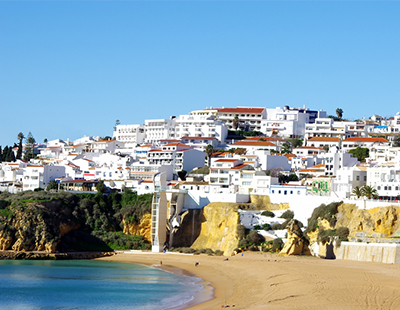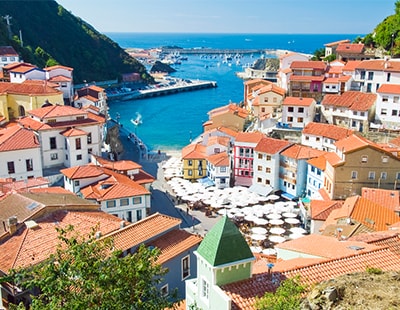It was moderated by Andrew Coutts, CEO of ILM Group Portugal, with a panel featuring Charles Roberts from Fine & Country, Matthew Krystman from Blevins Franks and Geoffrey Graham of EDGE International Lawyers, all of whom have been based in Portugal for many years.
Here, we explore the main take-homes from the webinar to decipher whether Portugal should be uppermost in an investor’s mind for the rest of this year and beyond.
How has Portugal handled the crisis and is it a safe haven?
“It’s handled it very well and yes, I think it is a safe haven,” Geoffrey Graham said. “Two things. Responsibility and continuity. The reaction of the Portuguese government was a responsible one. There was consensus between the Prime Minister and President despite them being from different parties. The state of emergency was implemented early on March 18, even though infections and deaths were very low at that point.”
He said the country was keen to implement a lockdown as soon as possible, to contain the virus, and to ensure the country’s health system – less sophisticated and less well-resourced than some of its richer counterparts in Western Europe – could cope.
“If Portugal had implemented its lockdown a few weeks later, it would have had three times as many ICU patients and would have struggled much more,” Graham added.
Thanks to its strong response, Portugal has been able to come out of confinement a little bit faster than other countries, albeit in a phased way.
“Deconfinement, as they call it, has increased. From June 1, larger shopping centres have been open, creches are open, cinemas are open, restaurants are now open. But staff are very responsible, wearing face masks. We have to wear face masks when entering and exiting as well.”
He said there has been continuity, too, with support for businesses and employees put in place and loans on very favourable teams. “There has always been one eye on post-lockdown, post-Covid-19, to help Portugal recover as quickly as possible.”
“Portugal’s been recognised as a country which has handled the crisis very responsibly and as a result there is an element of continuity moving forward.”
Matthew Krystman, who has lived in central Lisbon for 17 years, echoed Geoffrey’s comments, saying there had been a strong and coherent message from the Portuguese PM and President from the start. “This was shown in how people reacted. People from day one adhered to it. The opposition party aligned with the measures, too, both for lockdown and exiting the state of emergency.”
Charles Roberts, who has been based in the Lisbon and Cascais regions for many decades, agreed with his fellow panellists that Portugal had coped well with the pandemic.
He said, however, the new restaurant experience is very different. “The tablecloth’s not laid until you arrive. Waiters all tested and trained. No linen tablecloths, only paper. Knives and forks delivered like they are in an aeroplane.”
He said it was different, but nice to be out and about, experiencing some sense of normality again – albeit done in a very responsible way.
“Portugal has so far done well and set a good example,” Roberts added. However, when it comes to property, while virtual tours are currently an aid as restrictions on travel and movements remain, he said they were ultimately not a replacement for in-person viewings.
“Fine & Country is heavily dependent on people being able to visit properties in-person, so there are challenges there.”
The non-habitual tax regime and Golden Visa were important to Portugal in its recovery from the global financial crisis – will it the be the same again now?
“The NHR programme has been around since 2009 and has been a huge success,” Krystman said. “It was introduced when Portugal was going through a period of austerity and helped the market turnaround. The Lisbon/Cascais region was a big beneficiary of that.”
Portugal’s Golden Visa programme, meanwhile, started in 2012. “Both programmes have fared well in the crisis, with confidence remaining undiminished. We’ve seen a high level of demand for people looking to move to Portugal.”
While changes in the recent Portuguese budget mean the country now taxes pensions for non-residents at 10%, this is still much lower than other locations.
“Across the political spectrum, everyone agrees with NHR and the Golden Visa,” Krystman insisted. “It’s good for inward investment. It was supported by the right-wing government that introduced it, then the more liberal government that followed, then the socially democratic, left-leaning government we now have.”
Graham concurred that the Portuguese government is committed to the NHR programme. “We are facing another crisis. The Portuguese government is aware that foreign investment is important to exit any crisis,” he said.
What about inheritance tax? “Nothing changed with the budget itself,” Krystman said. “Therefore, it’s a territorial tax and applied to assets within Portugal. Inheritance tax is 0% for all descendants of an investor. It’s one of the biggest appeals.”
What are the main demand drivers for people buying Portuguese real estate? Will these change in the recovery?
“Fine & Country covers central and historical Lisbon, Porto and the north of the country, the Comporta region, and Estoril, Cascais and Sintra,” Roberts said.
“Typically, there are four different motives for buying a property in Portugal. One - a client looking to invest in a holiday property to use for a few weeks a year for family and friends. They’re looking for a management company to arrange rentals for the rest of the year, with all the work being done by the property company. This type of buyer is looking for an income that covers the fixed cost of the villa, apartment, whatever it might be.”
Secondly, he said, there are clients looking to invest in a second home in Portugal with no interest in generating income. Thirdly, there are those interested in owning a primary residence in Portugal, with no interest in earning income from their asset. Lastly, there are clients who buy property that they will never use themselves; it is purely an investment vehicle.
He said the Golden Visa and NHR schemes, as well as very favourable tax rates on pensions and inheritance tax, made Portugal very appealing to investors.
Principally, Fine & Country buyers in Portugal hail from Brazil, France, UK, Scandinavia and South Africa.
“Will this change? No, but the proportion in each buyer category may change,” Roberts said. “I firmly believe the attractions of Portugal - whether it be weather, lifestyle or fiscal - will be the same post-Covid as they were before. Lisbon, Cascais and Estoril are attracting thousands of people looking to live there permanently, particularly in historical Lisbon. There are lots of international schools in and around Lisbon, which also attracts buyers.”
How will Brexit affect British investors from January 1 2021 (the planned end date of the transition period)?
“We are still currently in the transition period,” Graham said. “It’s still possible for British citizens to establish residency in Portugal and for that to be protected post-Brexit. This has been assured by the Portuguese government in legislation and by immigration authorities. What’s also encouraging for British citizens, those who have residency will be granted that for five years without the need for renewal. You can still apply for permanent residency after five years, too.”
Once the transition ends, the door opens for British citizens to the Golden Visa – which is currently for non-EU/EEC citizens to claim residency. “One of the requirements is an investment in real estate of above £500,000,” Graham explains. “It’s a very successful programme which has worked well up till now.”
He said there are question marks over whether British citizens can already apply for a Golden Visa, with this remaining unclear at present.
“The message overall is,” Graham continued. “Those British citizens currently resident, nothing to worry about, while there are mechanisms available to those considering it in the future.”
Krystman said that we must remember that British people have been settling in Portugal for centuries, way before the Common Market (later the EU) existed. British people came for shipping, port production, mining. Many of those businesses set up then are still there today, including Taylor’s and Graham’s.
“Portugal and the UK also have the oldest alliance in the world,” Krystman added. “So there is a strong relationship there.”
“Before the transition period ends, residency can be claimed. If you are looking to move in the short-term, it’s probably wise to move before the end of the year. But if you move later than that, the Golden Visa will be an option.”
A recent Knight Frank report forecast that Lisbon will be one of only four major cities around the globe to see price growth in prime residential markets in 2020, with Monaco, Vienna and Shanghai the others. Do you agree and will Covid-19 have an impact?
“In general terms, yes,” Roberts said. “Particularly the historical and financial/business parts of Lisbon. The areas that are attractive to foreign investment.”
He added: “But Lisbon is not a big city. One of its boundaries is a river, which it can’t expand beyond. If you imagine Mayfair in London, it cannot grow. It’s a defined postcode. Lisbon is the same. If demand exceeds supply, prices rise.”
He said that planning approvals in Portugal take time, as does building. Demand is such that almost all off-plan units have been sold.
“Do I think there will be a price readjustment? If there is, it won’t be much and won't be for very long. It won’t be similar to the global financial crisis, when supply massively exceeded demand. Much of the development now is being done by international funds with very big balance sheets, not local developers.”
Roberts said Portugal and Greater Lisbon have seen huge growth in popularity as a tourist destination in recent years, with the price of luxury property rising as a result.
“But even now it’s nowhere near as expensive as London, Paris, Berlin, Cannes, etc. It’s on a par with high-quality real estate in Bratislava. There is lots of room for prices to rise.”









.png)










Join the conversation
Be the first to comment (please use the comment box below)
Please login to comment